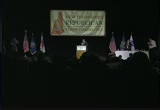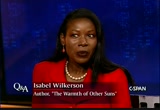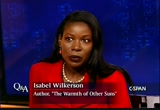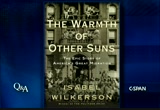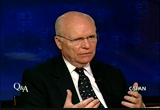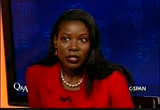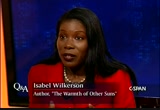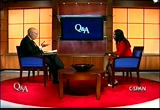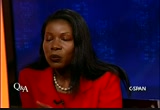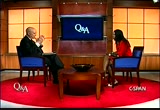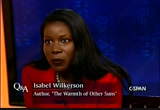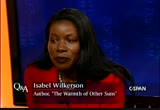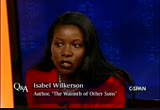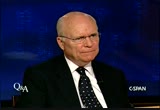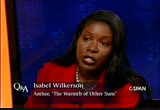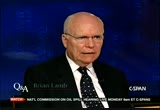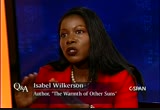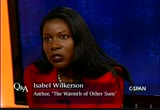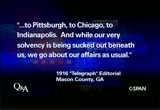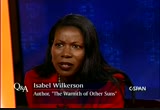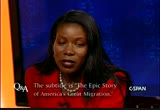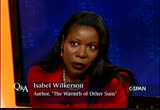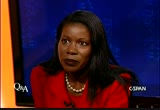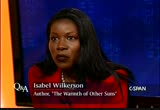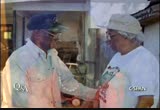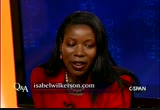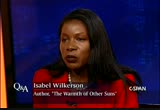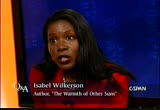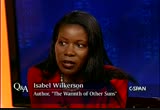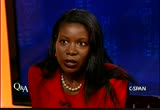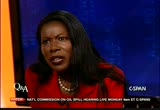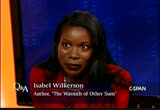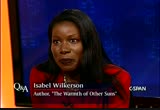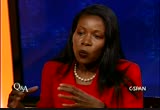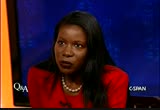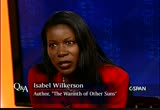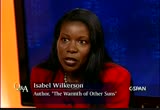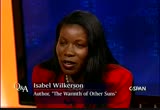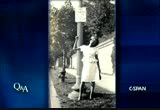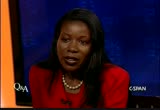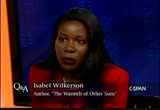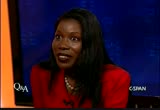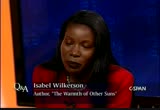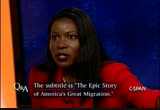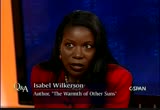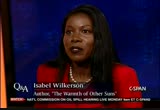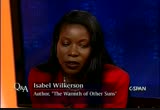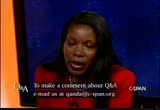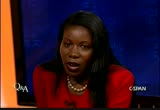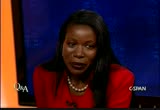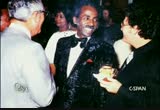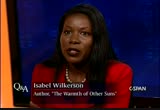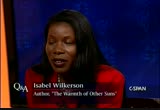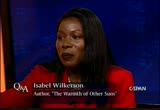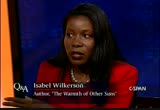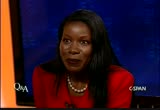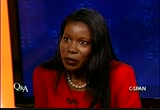tv Q A CSPAN September 26, 2010 8:00pm-9:00pm EDT
8:00 pm
>> next, isabel wilkerson. then the deputy prime minister speaks at the labor >> sweet on q&a, is a bell wilkerson talks about her book detailing in the south between 1915 and 1917. it is called the called "the warmth of other suns". >> isabel wilkerson, author of "the warmth of other suns", the you remember the moment that you thought about doing this?
8:01 pm
>> cannot say what the moment was because i have been living it all my life. my parents migrated from the south to washington d.c., my mother from georgia, my father from southern virginia. they met in washington and married and had me. without the great migration, i would not be here. i have lived with all my life. i grew up with people from north carolina, south carolina, georgia, all around me. i was surrounded by the language, the food, the music, the ambitions of the people who migrated from the south. they argue about whose child would go to which school. it has been with me all this time. when it comes to the actual writing of a book, it probably writing of a book, it probably started after i got out and have been a reporter for "the new york times" talk to people.
8:02 pm
i was the chicago bureau chief for the "the new york times" i began to hear that there were similar migration experiences that people have. they talk about it as if they could not talk because they were going back to a family reunion in mississippi or a funeral. this is so much bigger than my experience in washington. it was a national outpouring of people. >> just give us a brief synopsis of what the book is about. >> the book is about the migration experiences of three people that have become part of the larger whole, which was the defection of 6 million african americans from the south to the north, to the midwest and west from 1915, world war i until
8:03 pm
1970. >> i went to a movie last weekend. they handed me this. i want to read it to you. every day, more migrants are coming into the cities to seek a better life for their children. the scale of this massive migration from the poor countryside to the burgeoning cities is unprecedented in human history. the migrants provide a cheap source of labor booming cities and the thriving economy is built on the backs of those citizens. do you have any idea what country that is? >> i am thinking the united states. i wrote this book with the idea that it would refer to almost every immigrant that crossed the atlantic or the pacific ocean in order to come here. >> it is the movie called "the last train home."
8:04 pm
they had 130 million migrants that live in the city and migrate home each year. what you have in your book, by richard wright, i was leaving the south to fling myself into the unknown. i was taking a part of the south to transplant an alien soil, to see if it could grow differently, if they could drink of new and cool rains, been in strange wins, respond to the warmth of other suns and perhaps to bloom. who was he and why did you pick him for your title? >> he was one of the greatest novelists of the 20th century. he was a migrant from mississippi to chicago. he grew up the son of a sharecropper and always wanted to write and he set out on a journey to get to chicago and he spent his entire career --
8:05 pm
almost everything that he wrote was understanding the migration experience. i understand his connection between the south and north. >> he moved to paris to die? >> he ultimately was searching for the warmth of other suns. he went to chicago and then left the country altogether. >> you said that she interviewed 1200 people. " i stopped counting after that. >> how did you find them? >> i set out looking for three people and that took me to new york, chicago and los angeles. in all of those cities, i went centers.r sanus i had a booth at the juneteenth parade to collect names of people who might have migrated from the south to the north.
8:06 pm
i was going places where i might find people that were now seniors and might have been participants in this migration to the they were not hard to find. it was a matter of going in and talking to them and hearing their story. >> how did you gather the information? >> i took notes, obviously. it was essentially like an audition. it was like a casting call. >> what years were you doing this? >> it took me 15 years. it was basically 1995 and it took me about 18 months to interview from city to city, and going from place to place. this was an order to find these three. one of the most interesting things of the people were the clubs that exist in all of these cities. when you go to los angeles, there is a lake charles, louisiana club.
8:07 pm
there are multiple texas clubs, multiple new orleans clubs. i had to find a way to get access to them and then i would begin to interview them. it was a huge source of people. of the same goes for chicago with the greenville, mississippi club. there are the newton mississippi clubs. in new york, there are churches where almost everybody is from south carolina. >> what you do decide on the three that you would focus on? >> 1996. >> i am going to read a couple of things. he spent about 11 years at "the new york times." you are at boston university, right now, teaching. >> yes. >> you live in atlanta? >> i live in both cities. you taught at princeton for two
8:08 pm
years. you also taught at harvard and northwestern. why did she leave journalism? >> i do not consider myself to have left journalism. >> wanted to leave the newspaper? what i wanted to write this book. -- >> i wanted to write this book. i wanted to explore why these people left. i wanted to understand who they were, why they did what they did, and capture them before thit was too late. it began in 1915 and it ended in 1970. you are talking about three generations. they were getting up in years in time was running out. i felt this real press of time to get to them while there was still time to tell their story. >> what kind of a home to grow what then? your mother was from georgia and your father was from virginia, what is their story? >> they came up to washington
8:09 pm
d.c. at the end of world war ii. was a young girl and she found work in the government. she was doing filing worked for the government. there were many opportunities for people during world war ii. my father was a tuskegee airmen and after the war he came to washington as well. they never would have met otherwise. they both enrolled at howard university which is where they met. finally, they eventually realized they were the right people for one another and married and then there became me. >> brothers and sisters? >> i am the only child of my mother ever gave birth to because i was born very late in her life. my father died before the book came out and my mother is alive and has a shrine to the booked in her home. >> here in washington?
8:10 pm
no, she is an atlanta. >> what did you talk about day to day in your home the guts to into the journalism world? >> my father was a civil engineer. my mother had been a teacher. the idea of going into journalism was not anything that was ever discussed at all. i just have this affinity for writing and and if it in the -- and an affinity for english. this was always my passion. i was quite a curiosity to my parents because there had never been any journalists in the family. my mother later told me a story involving my grandfather, her father. it still gets to me about how he wanted to be a writer. there has been no one that was able to get into this. we did not talk about it. all i remember is that my father was a reader of the
8:11 pm
newspaper. he always had a newspaper. it was always important to be reading the newspaper. >> you picked three people, george s. swanson starling, and shing. joseph persia where did the first woman come from? why did to picker? >> she was from mississippi. she was the wife of a sharecropper where they were working the land during the -- before the depression. once the depression hit, they were still there. she was terrible at picking cotton. i never thought about someone being good or bad at it. she was really bad at it. a wonderful way of
8:12 pm
incorporating both the south and north into her psyche. she never changed her accent from the moment she arrived in chicago. she spent three times as many years in chicago than she did in mississippi, but when i met her, i could barely understand her. by the time i spent time with her, i could almost imitate her. >> how long did she live in mississippi and how long did she live in chicago? what's she left mississippi when she was in her mid-20s. the family left because there was a beating of a cousin of there's. it was over it best that he did not commit. -- it was over a fast that he did not commit. one particular night, before her husband had returned, there was a pounding at the door of her cabin.
8:13 pm
she had two young ones and a sister living with her, so she was surprised to be getting this kind of noise up front. there was a posse of men of front and they were looking for a cousin of hers. she said that he was not there. he had actually come in the house and gone through the back way to get away from the posse. she did not know anything about what he had done. later on, when the husband got back home, she told him what had occurred and he went outside to find out what had occurred. joe lee had already been captured and he had been beaten with chains so badly that his clothes had adhered to his skin and he was thrown in jail instead of being taken to a doctor. it was her husband that went to retrieve him. after seeing what happened to his cousin, he went home to his wife and said that this is the
8:14 pm
last crop they were making. quietly, between the two of them, they took what little they had and quietly went to her mother's house to position themselves to leave. as soon as the cotton was picked, they got on the train out of the area of north, landing in chicago and then ultimately settled in chicago. >> in what year did they leave? >> 1937. >> by that time, how many have left the south? >> there would have been about 1 million people who would have left by that time. there was about a half-million in the first world war i migration and was another half million during the depression years.
8:15 pm
it really took off during world war ii. that was the largest migration during each period of time, sociologists were assuming that it would be over. they were looking at what the impetus for it was. the economics of the north was thought to be the main impetus. that was a factor, but once the door had been opened by the north, because world war i the beginning of it -- was the beginning of it. all of the workforce that were feeding the steel mills and all of the factories of the north had no labor. they began to look to the south for cheap labor. that meant they had to go to african americans and try to recruit them to the north. >> what was her life like
8:16 pm
otherwise in mississippi? what kind of things could she not do that what people could do. >> she very rarely ventured out from the yacht were she was. life was very controlled. that they had so little free time. her life was fairly isolated. whenever she would go out, there was -- every aspect of life was controlled. for example, the access to a position was impossible. physicians would not go out to the country were she was. jim-crow had rules and laws that seem arcane now. it was illegal for a black person and a white person to play checkers together. she did not worked anywhere but the fields. blacks and whites could not walk
8:17 pm
up the same staircase where they might have worked together. in certain courthouses, there was a black bible and a white bible on which to tell the truth. there was a case where it became an issue because they could not find the black bible, so it find the black bible, so it became front-page news in one of the north carolina newspapers that i came upon. they could not find the black bible, so they had to halt the court proceedings and the judge said that they might as well follow what the law is and find a bible. >> did you ever ask any of the old time white people what they had such rules? what i did not spend a lot of time talking to a lot of the white people. there was a lot written about that already.
8:18 pm
much of the material about the white perspective was widely disseminated. there are many wonderful books about the. -- about it. there are so many wonderful things that have been written that give a wonderful sense of how people were viewing it. the newspapers broke endlessly about it. i " many of those -- by quote many of those. >> everybody seems to be asleep about what is going on under our noses. that is, everybody but those farmers that have woken up and found every negro over 21 on his place gone to chicago, indianapolis. while it was being sucked out
8:19 pm
beneath them, the goal about their affairs as usual. that sounds like a liberal editorial in the deep south. why would they have that? >> nothing was done to keep these people from leaving. they were born to lose their source of labor. that cheap labor was the underpinnings of the southern economy. they depended on that. it was an expensive proposition to plant an entire field of crops and not know what would happen to it. at a certain point, i read all about cotton production. it is a hazardous, difficult job. there are all kinds of things that can go wrong that required just the right amount of rain and not too much rain. it requires just the right number of days of sunshine, but not too much sunshine. there are so many factors that they were dependent upon that
8:20 pm
the margin for error was so great, and they needed the hands available in order to pick the cotton once it was there. they could not afford to be losing belabor. >> did i read that you and i may win back down to the cotton fields? >> yes, i wanted to go back with all of them. all of them. her family was game and i made arrangements to go back. we drove down highway 61 and made it to the parkway and as we were driving closer to the county were she lived, we came upon some cotton fields. i wanted to go back at the same time that she would have left, which would have been about now. it was fall of the year. it was high picking season in
8:21 pm
mississippi where she lived. we saw the cotton fields wide open and there were no cars. she wanted to get out and pick. i asked if she was sure that we could do this. this land belongs to someone. we are in mississippi. she said that they would not care what little bit we would pick. she jumped out of the car and went out into the rows of cotton and started picking up. i went with her and she seemed to be giddy. she hated picking cotton when she had to, but now that she did not have to, it was like he could not stop her. >> what was life like in chicago? >> they have a hard time making the adjustment. they arrived as part of a group of people from the south. the men could find work because
8:22 pm
strong backs were valued. they could find work in the slaughterhouses and the foundries and the steel mills. she had trouble finding work. they were -- there were many emerging groups they were competing with. they were also newly arrived and they often were further along in the queue when it came to domestic work. clearly, working in an office was not something she would be able to do. it took a very long time for her to be able to find work. it took a time for her husband to find work. he was willing to take work because it was something he could do. it was not enough to take care of the family. they move from place to place as they tried to find the right location that they could afford. they had a difficult time.
8:23 pm
>> how did she feel about the move in the end? >> she was the kind of person to accept her lot. for all of the people in the book, there are many mistakes that they might have made in her -- in their lives, but moving from the south was not one of them. >> they did not regret it? >> no. >> you said that the family has a room that is laid out? >> her bedroom remains untouched. no one can bear to go in it. >> she was the matriarch of the family. she was one of the wisest and most beautiful people i have ever met in my life. doing this book changed me in so many ways. many ways. she had a way of accepting what was it and recognizing what you could not change and moving on
8:24 pm
and not living in the past. she was beloved by everyone. she was such a special person. one of the things that we did was look at one of the people thought she was being courted by two men. that is where the book begins. her decision by which of those men was going to ultimately be the deciding point for her life, had she gone with one man, she would have been going to chicago. the other man decided to stay. when we went back to mississippi, we looked him off and we found him. he instantly recognized her and it had been 60 years. all of those decades, and miles did not mean anything. he instantly recognized her and asked how she was. he reached for her arm and it
8:25 pm
was a beautiful moment. and then his wife came out. >> were you there? >> yes. >> what was it about her when you met her and how did you meet her to make you choose her? >> one of the places that i went was the retiree boards of the union's of various trades. i went to the workers -- people who have been retired from the chicago transit authority. when i went to the retirees meeting for the cta, i passed around the flyer that i've passed around and made my statement and there was a woman there who signed up. many people signed up because most of them were from the south
8:26 pm
or had relatives in the south. she said that she did not make the decision to come to chicago, but her mother did. it was her daughter that signed her up. when i met with her, she was wonderful. >> did you know on the spot that she would be the one? what's i knew that i had a connection with her -- >> i knew that i had a connection with her. i narrowed it down to 30 and she was included in one of the 30. it was essential that the three characters be easily distinguishable. you could turn into a page and know who you were reading about. i did not want them to all the sharecroppers. i did not want them all to be middle-class or working-class. i wanted them to be distinctive. they all become one because that all complement one another. -- because they all complement
8:27 pm
one another. you actually look at the circumstances of all three, where did they begin? where did the land? what were their personalities? you have to have a board in which to have all of these characteristics and you say that these three will make the whole of the narrative. >> you have one in the 30's, one in their 40's and one in their 50s. one went to new york, to chicago and too late. -- and to los angeles. >> there was a college student at the time that the migration situation became relevant for him. he had dropped out of school because, at that time, african americans could not go to the state school. they were segregated and he
8:28 pm
could not go to them. there was one school that he could go to, but it was far from home. of the family decided that they were not want to keep sending him. they felt that he had enough schooling. therefore, he had to go back to the primary work for people in his part of central florida which was picking citrus. when he got out into the groves in the way that he did, he began to realize that they were being taken advantage of. the working conditions were poor and the pay was worse. they were being paid 10 cents to 12 cents a box for the dangerous work and going into a 30 ft. trees on ladders where people would fall while trying to pick. he began to try to organize the pickers to make a little bit more money. he would be asking for a nickel more a box as opposed to the 12
8:29 pm
cents or 15 cents. cents or 15 cents. each of those boxes were commanding $3 or $4 on the open market. he was asking for a nickel more. he would speak on behalf of all the picklers. he would have to keep them at bay when they wanted to pick. it worked last week, so they would try again this week. >> how old was he in 1945 when he left? what's he would have been 24 or 25. -- >> he would have been 24 or 25? he began to leave because the employers were plotting against him. he was told of this was dangerous, what he was doing. he had to flee for his life. >> how did he go? what's he caught the train -- >> he caught the train. >> he caught the train. >> what time of day did he
8:30 pm
leave? >> he left late in the afternoon and he could only go when the train was leaving. >> would anybody have tried to stop them? >> they apparently did not try to stop him. he asked a friend if he would take into the train station and they try to attract little attention. he did not want to let anyone know that he was prepared to leave. >> where did he go first? >> he went to harlem. he had previously tried detroit and found that he did not -- in detroit was not want to work for him because he was there during a bad time when there was a riot and that scared him off and he went back to florida. this last time, he ended up going to new york. >> where were these folks
8:31 pm
getting their money? >> they lived such meager lives , one man's father was the owner of local store. he did not have a lot of money, but they have the means to save up something. they work quite frugal. during the days when they were winning in the groves, they were making more money than they had before. >> what did he do when he got to harlem? >> he took a job as a railroad porter, where he ended up going right back to the south that he swore he never would go back to. he had no trouble finding work because being a male caucasian an advantage in that era. he also -- being a male gave him and then vanish in that area. he found a job as a railroad he found a job as a railroad porter and went back and forth and there are lots of stories of
8:32 pm
him going back and forth and then running into the experience of going back down south. going from a place that was free and an adjusting when he went back to the south. >> what were the adjustments? , if they wereor's southern, what often is treat some of reporters that he got on the bad side of one of the conductors. there was a perilous moment for him in which the conductor did not like what he thought was an imperious and dignity george a starling had which he did not think was fit for an african- american male. he thought he should be a little bit more humble. but george had more education than a lot of people that he had been around. he read a lot and he cannot help being himself.
8:33 pm
he did not play the game of being the shuffling sidekick and that did not go over well with the conductor. the conductor pushed him while the train was moving and george was between the train and the conductor and was hurled over a white woman to the star, of both him and the woman and woman asked why he would do that. george said to her that he is southern and he does those kinds of things. if you do not think this is a good thing, i would appreciate it if you would write in because there is nothing that i can do about it. about it. >> " you've used language like colored people" and "negros."
8:34 pm
what was your approach? >> i wanted the reader to be in a moment. if i was talking what it was like to be picking cotton, i wanted you to be able to imagine yourself there. the language all round them would have been that. i thought it would be more consistent we were in that era to be talking that way. define it jim-crow -- >> defined jim crow. >> it was a caste system where every move was controlled. the word can have multiple meanings. you can have a cast on your arm. blacks could not move freely in society. >> where did the name come from? >> it came from a 19th century
8:35 pm
minstrel. it was made popular by a minstrel performer that went all around the country and got quite rich doing this. he actually picked up on that by seeing the most common view is that he saw a slave that was disabled. he was unable to get properly -- to dance properly. he danced a dance called the jumping jim crow. the minstrel performer that performed in black face all over the country into the imitating him and ended up getting quite rich over it. he ended up dying quite young, in his 50s. he had been paralyzed in the end of his life.
8:36 pm
he himself ended up being disabled. it is one of those odd quirk of history. he suffered from what he had been making fun of all those years. >> was a different in each state? >> each state had its own rules. >> were there jim-crow loss in the north? what's there were jim crow laws in the north. -- >> there were jim crow laws and the north. jim crow was applied more in the north. >> are there any jim crow laws left anywhere? >> i am not aware of any. >> went to say they went away? >> it would have been a 1970's. there was a sheriff where george starling lived that refused to take down the colored and white sign in his office until the 1970's. he was voted out of office by
8:37 pm
the people, and the demographics have changed by then. >> is george still alive? >> no. >> how did you find him, where did you find him, and what was the end of his life like? >> he was a deacon in the church which is where he found a kind of peace for the difficult life that he had. he instantly began to tell stories about his experiences >> how did you find him? >> i found him at the church. >> you just went up to the church and said you were looking for people? >> i have a woman that was working with me and she was supposed to make contact with him. when i told him-when i heard about him, i wanted to talk with him and i did. >> there are no pictures in your book. no.
8:38 pm
>> why not? >> we wanted the reader to lose themselves in the narrative. to think about what you would have done in that situation, black or white. we thought that the photographs would it be something of a distraction to people. >> can we ever see these? >> on a website. >> i saw young lady on the website. is. -- is that ida mae? >> that is my mother. she saw a sign on the sidewalk that the"no standing." she pointed to it and her head is to the side in she is jubilant and she said that she is standing here at the no
8:39 pm
standing sign. >> i also saw the picture of a man sitting down. >> yes. >> who is that? >> there are several been. -- several men. there is a man in a flight suit. that is my father. >> how do you find them? >> i have not uploaded all of them yet. >> how did george starling die? >> he died somewhat heartbroken because his children had been swallowed up by the north that he fled to.
8:40 pm
they went back to the south. he was heartbroken. he was still strong, he had a brain, and in a sense, he had a stroke. he went into a coma. he was in new york. i went into the room expected all kinds of -- expecting all kinds of machines and i squeezed his hand and told him that i was there and he squeezed it back and he never regained consciousness. >> what happened to his children? >> his oldest son was sort of the lost child. he had gone up to see him in the hospital. he was in a coma by that time, and the suns saw him in that state and he was diabetic himself and he was so distraught that he had all kinds of things
8:41 pm
that were wrong with him and he essentially gave up. he died before his own father died. he died about a week before his father died. he refused to go to dialysis. george starling left this earth, not knowing that his son had died before him. >> the third person that you focus on is broader joseph pershing foster. >> it was the end of world were i when he was born and he was the hero of the day. she wanted her son to have this that would be important for the day.
8:42 pm
>> general pershing taught african americans. african americans. co>> i did not realize that. that is amazing. >> he was so tough, that he used the "n" word. >> i cannot say if his mother was aware of that. i doubt that she would have been. one of the things that i write about is that the whole naming of a child is a special thing for these parents in the south because there is very little else that they could give their children. they did not have resources, anyway. day often have these imperial type names. -- they often have these imperial type names. that was a way of giving credence to their children. the name pershing had meaning
8:43 pm
for her. >> in your book, he was in monroe, louisiana and went to los angeles. i do not want to hear about him until you tell us your story about you and your parents in a car. give us that whole plan. sleeping in a car? >> they told me the story of the migration after hearing it, i realize that in order for me to truly understand it, i needed to recreate it myself. what i did was i made arrangements to drive out there. i thought it would be a wonderful way-my parents decided they wanted to go with me. the journey took me from monroe, louisiana and then to houston
8:44 pm
and then to new mexico. he wanted to taste of tequila. that is another story about him. then we went through new mexico. he did not anticipate that he would have trouble finding a place to rest. >> what year did you drive that? >> i draw that in 1999, maybe. >> did you actually sleep in the car? >> we drove, to the letter, everywhere he went, del rio, texas and onto a tussle. then we got to -- on to el paso. we could not stop, because i was trying to recall what he did. we ended up driving and
8:45 pm
continued to drive and it got dark and the road got me and her hair pinned terurns. i told my parents the ground rules that they could not drive. i had to drive the whole way. the settlements are farther apart and it was dark and we were not in the rocky mountains. -- now in the rocky mountains. i was feeling the full facts of no sleep. -- effects of no sleep. your fingers begin to get swollen and they ate and your eyes get heavy and your eyelids want to close. everything is happening. there was no guard rail. when we got to yuma, ariz., my parents said that i must stop
8:46 pm
driving. we have lived it and we must not. -- must stop. >> when he went across the country, had he become a medical doctor yet? >> yes, he was in the army and the korean war. he had performed surgery in austria. when he was discharged, he found that he could not work in the hospital in his own hometown. >> why? >> because of the loss of jim- crow. hospitals did not allow black people to be doctors, to perform any kind of medical work in a hospital. he had a brother that was a physician and his brother found a way our roundup. the brother tried and would not
8:47 pm
be accepted. so, he created a portable hospital office in a car that he would carry around with him. he essentially had a kind of bed that someone could lay on and he had all of the supplies in the trunk of his car and he would go out in the country and serve the people that were the sharecroppers in the country. pershing did not want that for himself. he had a distinguished career in the army and you wanted to live out a life as he imagined it. -- he wanted to live out a life as he imagined it. in fact, at a certain point, he had to question whether he made the right decision. >> what kind of trouble did he run into? >> he found that no one would
8:48 pm
allow him to stay in the hotel for the night. he had the money to do it and he was an american citizen. he was well beyond the reach of the boundaries of jim crow. by this time, he was in the state of arizona. >> this is 1953. >> this is 1953. >> nowhere in arizona, did they tell him why? >> they did not tell him why. ultimately, the last place that he went, he ran into some people that were from illinois and they thought about it after the wife had seen him first and it gave him hope that he might be able to stay for the night. ultimately, she went back to talk to her husband and they talked for a long time and they said that they were from illinois and they do not share the views of the people around here, but they would be ostracized if they let him stay.
8:49 pm
i was surprised that it was as hard as it was. of the people met resistance wherever they went. they were wanted by the industry, but not the people they would encounter who would see them as competition. wherever these people whent, these were workers that were used to much lower pay. there was the potential for the to draw down the wages of those people who were around them. people who were around them. there was a lot of resistance to their arrival. they have to put up with a lot. -- they had to put up with a lot. i was not surprised that there was resistance. i am surprised that he ran into as much as he did just trying to find a room. >> where did you see him, meet with him and spend time with him?
8:50 pm
>> the way that i met him was the most interesting of all. i spent a great deal of time in los angeles, talking to any number of people that i could find who were connected to the south. i ran into all of these different clubs and the various creole clubs in so many different places. i went to so many places, that at some point, a woman came up to me and said that she had seen me at so many places talking about the migration and she saw that i was still looking. she said she knew the perfect person i could talk to. it was almost like being setup on a blind date. i met with him at his home in los angeles. al of legal, which was testament
8:51 pm
to his achievement and success in los angeles -- el lovely home, which was testament to his achievement and success in los angeles. he proceeded to tell me that he loves to talk and he is his favorite subject. >> was he married? >> he has been married. he was a widow. >> how old was he when you got to him? >> he was 76. >> what is the biggest store? when he wanted to go to vegas -- what is the loss they this story? story? -- what is the vegas story? >> vegas was off-limits to
8:52 pm
african americans. everything he had wanted to do in new orleans, the white physicians would come back with stories. they would ask him if he had been there. he would tell them that they know that he would not be able to go. to go. sometimes they would forget and he would say that again. he began to make some calls and he heard that it was beginning to open up to robert and americans. this was in the mid-1950s. a man was a go-between, helping black people get rooms in the hotels. you heard about judy kaye and he talked to jimmy day and said he was excited about going to
8:53 pm
vegas. he ended up being a really big gambler. ginnie gave said sure. he made arrangements. the hotel had all the latest conveniences. he used to sing songs to himself in anticipation of going. when they got there, they had all of this luggage. the women had been packing for weeks. there was no indication that there was a room for them. he began to have recollections of the experience that he had had crossing the desert not that long before. he had to call this man and make arrangements. they got him into another hotel, the sands. he was finally able to get to his room and he had a special suit and said that he bent over
8:54 pm
to spin the wheel and he said that he was in heaven. that is where he always wanted to be. >> we do not have a lot of time. you said that this change your life. in what way? >> it changed my life because it helped answer so many questions about how the country became to be. about how african-americans made it to the north and west. the majority of people that you might meet that are african american in the north and west are descendants of the south. that is something that a lot of people think about. it reminds me how much we have in common with one another. when i grew up here in washington, my father went to the trouble to make sure that i could go to the best school she could find.
8:55 pm
she made arrangements for a cab to take me there. i was 5 years old. she would tell the cabdriver not to pick the one alsop's -- to up.k anyone else >> the cab always looked into because it had a 5-year-old and it did when i got to school, i would run into all kinds of people from all over the country. country. even those that were american- born work from people from ireland or scotland or wherever they might have been, germany or russia. day, peopleck's would tell stories about life in the old country or their grandparents or the food. i felt that i did not have any stories to tell. it turns out that i actually
8:56 pm
did. there were many great stories that came out of this migration. >> did you have time to get married or have a family? >> i have been married. i am not married now. >> any children? >> know. -- no. >> how to survive financially during this book? >> random house was great. there were a great help. i also taught at princeton and at emory. i would write occasionally for it "the new york times." >> what is next? >> loss angeles -- los angeles. i am happy to see people buying the book, but i want people to read it. we have so much in common.
8:57 pm
they are beautiful people. >> if we see the pictures, we have a change of feeling about these folks? >> no, it will confirm what we already know. >> isabel wilkerson, the name of the book is "the warmth of other suns"." thank you very much for joining us. >> thank you very much for joininthank you for having me. >> for a dvd copy of this program call 1-877-662-7726. for free transcripts or to give us your comments about this program, visit us at q&a.org. episodes are also available as podcasts.
8:58 pm
>> next, british deputy prime minister nick clegg speaks at the conference. after that, a conversation with former house speaker newt gingrich then, former governor met rham a speech to new hampshire audiences. >> tomorrow, political correspondent philip rucker talks about attitudes among suburban and urban voters. the and daniel pletka discusses conservative views on national defense out of the united states and david armor that the impact of school desegregation on school districts and local education. "washington journal," live at 7:00 a.m. eastern on c-span. >> the c-span video library is in the news this week is in the
8:59 pm
"washington post." with nearly every program since 1987, it is a great place to look for historical video. you will find it all free online anytime. >> the british house of commons was in recess this week. british deputy prime minister nick clegg spoke at his party's conference on monday. he listed the top priority of cutting public spending costs. he also talked about reforming the voting system. this portion of his remarks is 30 minutes.
123 Views
IN COLLECTIONS
CSPAN Television Archive
Television Archive  Television Archive News Search Service
Television Archive News Search Service 
Uploaded by TV Archive on

 Live Music Archive
Live Music Archive Librivox Free Audio
Librivox Free Audio Metropolitan Museum
Metropolitan Museum Cleveland Museum of Art
Cleveland Museum of Art Internet Arcade
Internet Arcade Console Living Room
Console Living Room Books to Borrow
Books to Borrow Open Library
Open Library TV News
TV News Understanding 9/11
Understanding 9/11